13 have author last names that start with O have author last names that start with O
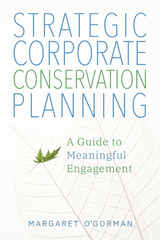
Recognizing the long history of mistrust between corporate action and environmental effort, Strategic Corporate Conservation Planning begins by explaining how to identify priorities that will yield a beneficial relationship between a company and nonprofit. Next, O’Gorman offers steps for creating ecologically-focused projects that address key business needs. Chapters highlight existing projects with different scales of engagement, emphasizing that headline-generating, multimillion dollar commitments are not necessarily the most effective approach. Myriad case studies featuring programs from habitat restoration to environmental educational initiatives at companies like Bridgestone USA, General Motors, and CRH Americas are included to help spark new ideas.
With limited government funding available for conservation and increasing competition for grant support, corporate efforts can fill a growing need for environmental stewardship while also providing business benefits. Strategic Corporate Conservation Planning presents a comprehensive approach for effective engagement between the public and private sector, encouraging pragmatic partnerships that benefit us all.
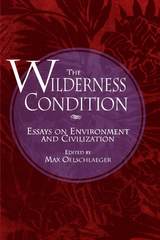
This book aims to introduce to a larger audience issues that are too often limited to scholarly circles. A thought-provoking collection of essays by some of the environmental movement's preeminent thinkers, The Wilderness Condition explores the dynamic tension between wild nature and civilization, offering insights into why the relationship has become adversarial and suggesting creative means for reconciliation. Contributors include Paul Shepard, Curt Meine, Max Oelschlaeger, and George Sessions.

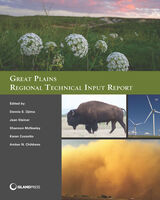
The Great Plains states are already experiencing the impacts of a changing climate, and will likely continue to experience warming temperatures, more extreme precipitation events, reduced snow and ice cover, and rising relative sea levels. The book presents a review of the historic, current, and projected future climate of the region; describes interactions with important sectors of the Northeast and examines cross-sectoral issues, namely climate change mitigation, adaptation, and education and outreach.
Rich in science and case studies, it examines the latest climate change impacts, scenarios, vulnerabilities, and adaptive capacity and offers decision makers and stakeholders a substantial basis from which to make informed choices that will affect the well-being of the region's inhabitants in the decades to come.
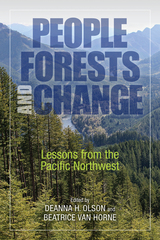
In People, Forests, and Change: Lessons from the Pacific Northwest, editors Deanna H. Olson and Beatrice Van Horne have assembled an expert panel of social and forest scientists to consider the nature of forests in flux and how to best balance the needs of forests and the rural communities closely tied to them. The book considers the temperate moist-coniferous forests of the US Pacific Northwest, but many of the concepts apply broadly to challenges in forest management in other regions and countries. In the US northwest, forest ecosystem management has been underway for two decades, and key lessons are emerging. The text is divided into four parts that set the stage for forests and rural forest economies, describe dynamic forest systems at work, consider new science in forest ecology and management, and ponder the future for these coniferous forests under different scenarios.
People, Forests, and Change brings together ideas grounded in science for policy makers, forest and natural resource managers, students, and conservationists who wish to understand how to manage forests conscientiously to assure their long-term viability and that of human communities who depend on them.
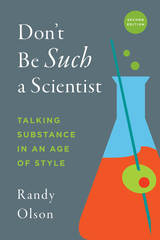
The time is right for a new edition of Olson’s revolutionary work. In Don’t Be Such a Scientist, Second Edition, Olson renews his call for communication that stays true to the facts while tapping into something more primordial, more irrational, and ultimately more human. In more than 50 pages of new material, Olson brings his pioneering message to this new age, providing tools for speaking out in anti-science era and squaring off against members of the scientific establishment who resist needed change.
Don’t Be Such a Scientist, Second Edition is a cutting and irreverent manual to making your voice heard in an age of attacks on science. Invaluable for anyone looking to break out of the boxes of academia or research, Olson’s writing will inspire readers to “make science human”—and to enjoy the ride along the way.
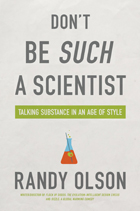
After nearly a decade on the defensive, the world of science is about to be restored to its rightful place. But is the American public really ready for science? And is the world of science ready for the American public?
Scientists wear ragged clothes, forget to comb their hair, and speak in a language that even they don't understand. Or so people think. Most scientists don't care how they are perceived, but in our media-dominated age, style points count.
Enter Randy Olson. Fifteen years ago, Olson bid farewell to the science world and shipped off to Hollywood ready to change the world. With films like Flock of Dodos: The Evolution-Intelligent Design Circus (Tribeca '06, Showtime) and Sizzle: A Global Warming Comedy (Outfest '08), he has tried to bridge the cultural divide that has too often left science on the outside looking in.
Now, in his first book, Olson, with a Harvard Ph.D. and formerly a tenured professor of marine biology at the University of New Hampshire, recounts the lessons from his own hilarious-and at times humiliating-evolution from science professor to Hollywood filmmaker. In Don't Be Such a Scientist, he shares the secrets of talking substance in an age of style. The key, he argues, is to stay true to the facts while tapping into something more primordial, more irrational, and ultimately more human.
In a book enlivened by a profane acting teacher who made Olson realize that "nobody wants to watch you think," he offers up serious insights and poignant stories. You'll laugh, you may cry, and as a communicator you'll certainly learn the importance of not only knowing how to fulfill, but also how to arouse.
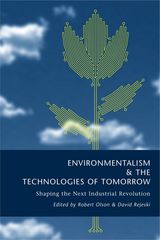
We sit at the doorstep of multiple revolutions in robotic, genetic, information, and communication technologies, whose powerful interactions promise social and environmental transformations we are only beginning to understand. How can we anticipate their impacts and ensure that these new technologies help move us in a more sustainable direction?
Environmentalism and the Technologies of Tomorrow is a collection of essays by leading scientists, technologists, and thinkers that examine the nature of current technological changes, their environmental implications, and possible strategies for the transition to a sustainable future. It offers a baseline understanding of new technological developments, as well as important insights for moving beyond business-as-usual by developing more anticipatory approaches to environmental protection and more comprehensive strategies for promoting the transformation of technology.
Among the contributors are Brad Allenby, David Bell, Steward Brand, Michael Braungart, Lester Brown, Joanne Ciulla, Denis Hayes, Hazel Henderson, Amory Lovins, William McDonough, Gary Marchant, David Ronfeldt, John Seely-Brown, Gus Speth, and Timothy Sturgeon.
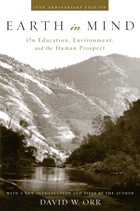
In Earth in Mind, noted environmental educator David W. Orr focuses not on problems in education, but on the problem of education. Much of what has gone wrong with the world, he argues, is the result of inadequate and misdirected education that:
- alienates us from life in the name of human domination
- causes students to worry about how to make a living before they know who they are
- overemphasizes success and careers
- separates feeling from intellect and the practical from the theoretical
- deadens the sense of wonder for the created world
The author begins by establishing the grounds for a debate about education and knowledge. He describes the problems of education from an ecological perspective, and challenges the "terrible simplifiers" who wish to substitute numbers for values. He follows with a presentation of principles for re-creating education in the broadest way possible, discussing topics such as biophilia, the disciplinary structure of knowledge, the architecture of educational buildings, and the idea of ecological intelligence. Orr concludes by presenting concrete proposals for reorganizing the curriculum to draw out our affinity for life.
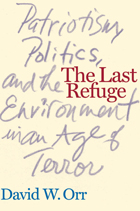
"Patriotism is the last refuge of scoundrels" -SAMUEL JOHNSON, 1775
Updated and revised following the 2004 elections, The Last Refuge describes the current state of American politics against the backdrop of mounting ecological and social problems, the corrosive influence of money, the corruption of language, and the misuse of terrorism as a political issue.
Setting out an agenda that transcends conventional ideological labels, David Orr contends that partisan wrangling is only a symptom of a deeper dysfunction: The whole political machinery that connects Americans' fundamentally honorable ideals with public policy is broken. The book offers a withering critique of the failings of the Bush administration, supplemented by new essays that look at the national-level dominance of the Republican Party and examine the fallacy that the evangelical right represents a Christian majority.
After analyzing the challenges of reforming the current system, Orr offers an empowering vision of a second American Revolution that peaceably achieves sustainability and charts a hopeful course for forward-looking citizens.
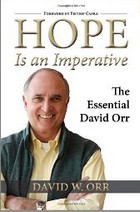
Hope Is an Imperative brings together in a single volume Professor Orr’s most important works. These include classics such as “What Is Education For?,” one of the most widely reprinted essays in the environmental literature, “The Campus and the Biosphere,” which helped launch the green campus movement,and “Loving Children: A Design Problem,” which renowned theologian and philosopher Thomas Berry called “the most remarkable essay I’ve read in my whole life.”
The book features thirty-three essays, along with an introductory section that considers the evolution of environmentalism, section introductions that place the essays into a larger context, and a foreword by physicist and author Fritjof Capra.
Hope Is an Imperative is a comprehensive collection of works by one of the most important thinkers and writers of our time. It offers a complete introduction to the writings of David Orr for readers new to the field, and represents a welcome compendium of key essays for longtime fans. The book is a must-have volume for every environmentalist’s bookshelf.
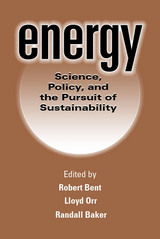
In the early 2000s, energy prices have fluctuated wildly, from historic highs in the winter and spring of 2001 to the lowest wholesale prices in decades a few short months later. As the largest user of fossil-fuel energy, the United States is the key player in the world's energy markets, and our nation's energy policy (or lack thereof) has become a subject of increasing concern.
Energy: Science, Policy, and the Pursuit of Sustainability is an essential primer on energy, society, and the environment. It offers an accessible introduction to the "energy problem" -- its definition, analysis, and policy implications. Current patterns of energy use are without question unsustainable over the long term, and our dependence on fossil fuels raises crucial questions of security and self-sufficiency. This volume addresses those questions by examining the three broad dimensions of the issue: physical, human, and political-economic. Chapters consider:
- the laws of nature and the impacts of energy use on our physical and ecological life-support systems
- the psychological, social, and cultural factors that determine how we use energy
- the role of government actions in adjusting costs, influencing resource consumption, and protecting the environment
- how markets work, and the reasons and cures for market failures in responding to long-term environmental and energy problems
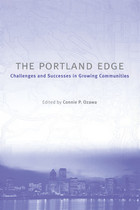
Portland, Oregon, is often cited as one of the most livable cities in the United States and a model for "smart growth." At the same time, critics deride it as a victim of heavy-handed planning and point to its skyrocketing housing costs as a clear sign of good intentions gone awry. Which side is right? Does Portland deserve the accolades it has received, or has hype overshadowed the real story?
In The Portland Edge, leading urban scholars who have lived in and studied the region present a balanced look at Portland today, explaining current conditions in the context of the people and institutions that have been instrumental in shaping it. Contributors provide empirical data as well as critical insights and analyses, clarifying the ways in which policy and planning have made a difference in the Portland metropolitan region.
Because of its iconic status and innovative approach to growth, Portland is an important case study for anyone concerned with land use and community development in the twenty-first century. The Portland Edge offers useful background and a vital overview of region, allowing others to draw lessons from its experience.
READERS
Browse our collection.
PUBLISHERS
See BiblioVault's publisher services.
STUDENT SERVICES
Files for college accessibility offices.
UChicago Accessibility Resources
home | accessibility | search | about | contact us
BiblioVault ® 2001 - 2024
The University of Chicago Press









